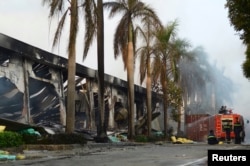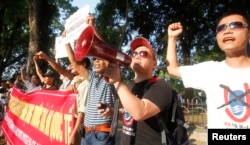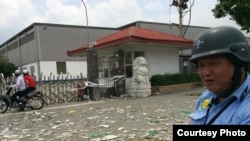HANOI —
In Vietnam, businesses affected by last week’s deadly anti-China riots are beginning to piece their operations back together. But questions remain over whether any permanent damage has been done to the country’s investment prospects over the protests that got out of control.
Vietnam is still reeling from riots which erupted in industrial parks on the outskirts of Ho Chi Minh City and later in central province Ha Tinh, where two Chinese workers were killed and over 100 wounded.
The riots broke out following heightened tensions over a Chinese oil rig deployed between Vietnam and the Paracel islands - which both countries claim.
Jerry Shum, investor relations director at Yue Yuen Industrial Holdings Ltd, a sports shoe manufacture which supplies Nike Inc. and Adidas AG, said operations in South Vietnam were now running normally.
“We have confidence, given what we have heard from our sources, that the Vietnamese government will restore law and order soon,” he said in an emailed comment to VOA.
He said the company took precautions last week and did not experience any damage or violence, adding: “We are still committed to operate in Vietnam and see it as an important part of our operations.”
Return to normal will take time
It will take time before things are back to normal, says Adam Sitkoff, executive director of the American Chamber of Commerce in Hanoi, and the business community is encouraging the government to help in a fair and transparent way.
“Talking to Taiwanese and Koreans and others, the big issues now are how to handle the logistics of getting things back to normal. That involves some of the technical stuff like wage payments, social and health insurance and stuff. In the time period when things weren’t working because things were shut down, who pays for that?” he said.
Sitkoff says although the riots have temporarily shaken investor confidence, they will not affect Vietnam’s long-term investment prospects.
This is partly because the government has made it very clear that this will not happen again, Sitkoff says.
“It’s done a very effective job of reaching out to key stakeholders and making sure that people understand that their priority is to continue calm and stability here and to let foreign investors know that the attributes that make Vietnam an attractive destination for investment are still going to continue here and that people don’t need to worry,” he said.
At a news conference on Saturday, Do Nhat Hoang, director of Vietnam’s Bureau for Management of Foreign Investment under the Ministry of Planning and Investment, said Taiwanese companies had been mistaken for Chinese.
Wait-and-see
Hoang said Vietnamese authorities are taking appropriate measures to assist investors in restarting production.
However, not everyone is so confident.
Economist Vuong Quan Hoang, co-author of What We See, Why We Worry, Why We Hope: Vietnam Going Forward says he believes investors will keep a “wait-and-see attitude” for some time.
He said part of the problem is that the government’s decision-making process on this issue is not clear from the outside, and analysts are left to speculate.
“I don’t know whether such a political will be able to make things happen the way politicians and leaders want," said Hoang. "Apparently they didn’t want to see the riots and the kind of effect we’ve been seeing over the past week. Nobody wanted that.”
The crisis could also lead to changes within the country. Some observers have said anti-China protests sparked riots among factory workers because of grievances over poor working and living conditions.
Need for reforms
Hoang said it is good that this issue has been raised.
“Now they also raise [the] issue about the roles of trade unions in those factories. I know that the issue is not easy to solve, but at least big brains in society will have to sit down and agree that these are things we have to discuss," he said.
Sitkoff says the current environment is a good opportunity for Vietnam to make itself even more attractive to foreign business and undertake some of the reforms that have been necessary for a long time to make the country more competitive.
The Vietnamese government feels bad, he says, and it wants people to come back.
Factories Torched in Anti-China Protests in Vietnam
Vietnam is still reeling from riots which erupted in industrial parks on the outskirts of Ho Chi Minh City and later in central province Ha Tinh, where two Chinese workers were killed and over 100 wounded.
The riots broke out following heightened tensions over a Chinese oil rig deployed between Vietnam and the Paracel islands - which both countries claim.
Jerry Shum, investor relations director at Yue Yuen Industrial Holdings Ltd, a sports shoe manufacture which supplies Nike Inc. and Adidas AG, said operations in South Vietnam were now running normally.
“We have confidence, given what we have heard from our sources, that the Vietnamese government will restore law and order soon,” he said in an emailed comment to VOA.
He said the company took precautions last week and did not experience any damage or violence, adding: “We are still committed to operate in Vietnam and see it as an important part of our operations.”
Return to normal will take time
It will take time before things are back to normal, says Adam Sitkoff, executive director of the American Chamber of Commerce in Hanoi, and the business community is encouraging the government to help in a fair and transparent way.
“Talking to Taiwanese and Koreans and others, the big issues now are how to handle the logistics of getting things back to normal. That involves some of the technical stuff like wage payments, social and health insurance and stuff. In the time period when things weren’t working because things were shut down, who pays for that?” he said.
Sitkoff says although the riots have temporarily shaken investor confidence, they will not affect Vietnam’s long-term investment prospects.
This is partly because the government has made it very clear that this will not happen again, Sitkoff says.
“It’s done a very effective job of reaching out to key stakeholders and making sure that people understand that their priority is to continue calm and stability here and to let foreign investors know that the attributes that make Vietnam an attractive destination for investment are still going to continue here and that people don’t need to worry,” he said.
At a news conference on Saturday, Do Nhat Hoang, director of Vietnam’s Bureau for Management of Foreign Investment under the Ministry of Planning and Investment, said Taiwanese companies had been mistaken for Chinese.
Wait-and-see
Hoang said Vietnamese authorities are taking appropriate measures to assist investors in restarting production.
However, not everyone is so confident.
Economist Vuong Quan Hoang, co-author of What We See, Why We Worry, Why We Hope: Vietnam Going Forward says he believes investors will keep a “wait-and-see attitude” for some time.
He said part of the problem is that the government’s decision-making process on this issue is not clear from the outside, and analysts are left to speculate.
“I don’t know whether such a political will be able to make things happen the way politicians and leaders want," said Hoang. "Apparently they didn’t want to see the riots and the kind of effect we’ve been seeing over the past week. Nobody wanted that.”
The crisis could also lead to changes within the country. Some observers have said anti-China protests sparked riots among factory workers because of grievances over poor working and living conditions.
Need for reforms
Hoang said it is good that this issue has been raised.
“Now they also raise [the] issue about the roles of trade unions in those factories. I know that the issue is not easy to solve, but at least big brains in society will have to sit down and agree that these are things we have to discuss," he said.
Sitkoff says the current environment is a good opportunity for Vietnam to make itself even more attractive to foreign business and undertake some of the reforms that have been necessary for a long time to make the country more competitive.
The Vietnamese government feels bad, he says, and it wants people to come back.
Factories Torched in Anti-China Protests in Vietnam







